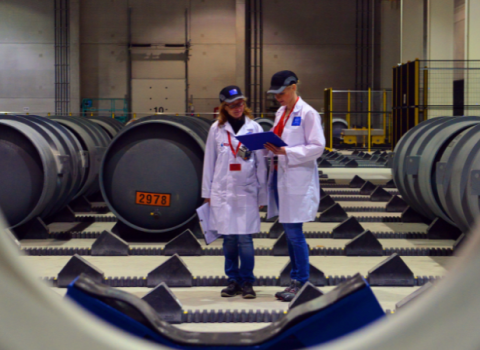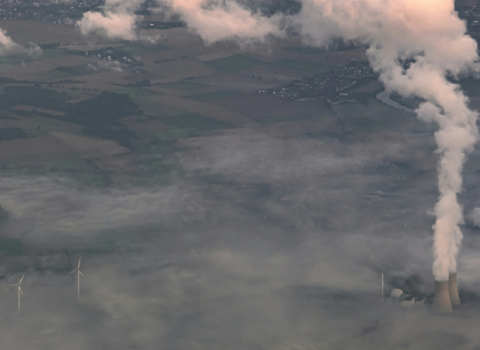Industry wants funding fitted to its needs, but other says data must flow to move the whole sector forward

Photo credits: Rost-9 / BigStock
Small modular nuclear reactors (SMRs) are getting more political support in Europe and are likely to benefit from a planned increase in spending on nuclear R&D through the Euratom programme. But industry insiders and other observers say this will not be enough for the rapid deployment of SMRs.
“The industry needs money for the SMR vendors to advance their own research and accelerate the deployment of their SMRs,” Emmanuel Brutin, director general of industry group NuclearEurope, said to Science|Business. “The supply chain needs money and clear perspective [targets] to increase capacity.”
The increase in funding planned for nuclear fission R&D in the next round of the Euratom programme is a positive development but is not suitable for addressing these gaps. So, Brutin hopes that SMR research can be included in other EU funding mechanisms to speed up deployment.
“Project owners and vendors could use Euratom funds to do some research, but they are not suitable [for all their needs] given the usually long duration of these projects and the fact that, to produce something useful for a specific vendor, they would have to make public parts of their intellectual property,” Brutin said.
The unwillingness of the industry to open up in other ways is a further drag on progress, according to Didier Jacquemain, senior nuclear safety specialist at the OECD Nuclear Energy Agency.
“SMR designs are advancing at different readiness levels, but restricted access to vendor data hampers collaborative research and the development of shared infrastructure,” he said. “In parallel, research on novel designs focuses on proof-of-concept rather than on fully substantiated safety cases. As a result, critical safety knowledge gaps persist, with implications for regulatory approval which may impact the deployment of some concepts.”
Open access data
Sharing results is an important consideration in the development of Europe’s capabilities in SMRs, according to Fulvio Mascari, a researcher in the nuclear department at ENEA, Italy’s National Agency for New Technologies, Energy and Sustainable Economic Development.
“To further accelerate deployment, research should focus on large-scale experimental programmes to develop open-access data,” he told Science|Business.
This means that, in addition to valorising its existing infrastructures, the EU should invest in large-scale experimental facilities. “This would enable the demonstration of innovative [SMR] features, the development of reliable computational tools and methodologies to simulate plant behaviour across all plant states, the assessment of effective accident management strategies, and the training of a new generation of experts.”
This last element, he said, is “key to building the critical mass required to deploy safe nuclear technology on schedule.”
Newcleo, a French company developing lead-cooled SMRs, also sees an infrastructure gap. According to a spokesperson, Europe lacks a pan-European collaborative R&D infrastructure to test materials and fuels for all advanced modular reactors (AMRs), of which SMRs are a subset, and more specifically a high flux and high-power fast neutron irradiation facility.
As things stand, over 80 SMR technology designs have reached various stages of development in 18 countries, but there are very few commercial SMRs in operation. Two notable cases are Russia’s Akademik Lomonosov, a floating nuclear power plant equipped with two KLT-40S SMRs, and HTR-PM, a modular high-temperature gas-cooled reactor owned by the China Huaneng Group.
In Europe, Norway, Sweden and Poland have the most projects underway, but the majority of reactors are only at the pre-investment phase. Euratom currently co-funds 16 SMR projects addressing both safety and performance issues, including accident scenario analysis, passive safety, licensing harmonisation, novel fuels and hybrid energy systems.
Research gaps
For Mascari, safety is “the cornerstone of nuclear credibility” as a viable solution to achieve climate neutrality by 2050 and support Europe’s energy security and independence.
Newcleo agrees, but sees this as a matter for industry rather than public research. “As the industry already operates with a ‘safety first’ approach, researchers should focus on designing with deployment in mind by creating solutions that are licensable across the EU and manufacturable at scale,” its spokesperson said.
Related articles
- Industry alliance backs research push for small modular nuclear reactors
- Euratom: €9.8 billion for nuclear research in the next EU budget
Jacquemain has a longer list of technical areas where research should be prioritised, including the development of multiphysics simulations to support reactor design and safety analyses, along with advancing fuel performance for both conventional and emerging technologies. “Equally important is the early incorporation of a sustainable spent fuel and waste management strategy throughout the entire lifecycle of advanced modular reactors,” he said.
He also pointed to the importance of both confirmatory and anticipatory research: the former to hold an independent validation of the claims made by designers supporting credible regulatory oversight, and the latter to enable early-stage studies to implement safety principles for novel concepts.
“It is also worth noting that regulatory frameworks must evolve to ensure SMR compatibility with hybrid energy systems,” Mascari said. “At the same time, there is a clear need to increase harmonisation of regulatory frameworks across European countries to streamline licencing efforts and facilitate cross-border deployment and international cooperation.”
This is also important for the industry. “Shared AMR safety and licencing frameworks are essential to accelerate market deployment, support the scalability of standardised reactor designs across member states, and ensure projects are investable and delivered on time and on budget,” the Newcleo spokesperson said.
But most of all, the company wants to see “an unambiguous long-term policy commitment to deploying and supporting nuclear energy” from the EU, in order to de-risk the industry and help attract complementary private capital.
“In contrast to the US, where a clear federal commitment has triggered strong private investment, Europe still sends mixed signals,” its spokesperson said. “While Euratom’s proposed new budget is a welcome improvement, the current [Multiannual Financial Framework] explicitly bans funding to deployment of nuclear projects, creating a structural contradiction that undermines investor confidence.”





 A unique international forum for public research organisations and companies to connect their external engagement with strategic interests around their R&D system.
A unique international forum for public research organisations and companies to connect their external engagement with strategic interests around their R&D system.